Learn about the different applications of QR codes in the hotel industry to enhance guest experience and team efficiency.
QR codes have emerged as a convenient tool that enhances efficiency and saves time both for guests and hotel staff. Their applications in the hospitality industry are diverse and impactful. QR codes for hotels simplify check-in procedures, enable seamless room service requests, and streamline maintenance and housekeeping processes.
In this article we explore the benefits and different applications of QR codes in the hospitality industry.
What hotels use QR codes
 Famous hotels
Famous hotels
Leading hotel chains, including Marriott, Hilton, and Sheraton, have embraced QR codes as part of their operations, recognizing the numerous advantages they offer. These establishments use QR codes for various services, including room service, ordering food and drinks at the bar, and accessing information about the hotel and local area.
For example, Marriott has incorporated QR codes into their in-room dining service, granting guests access to the hotel menu and online ordering system with a simple QR code scan.
Hilton has also implemented room service QR codes and added codes to their brochures to provide guests with information about local attractions and services.
Sheraton has taken a step further by utilising QR codes to enhance the guest experience through interactive virtual tours of the hotel and its surroundings. Guests can scan these QR codes and access 360-degree videos and images of the hotel, allowing them to explore the property before they arrive.
QR codes have also found favour among smaller boutique hotels and independent properties seeking to elevate the guest experience. Via QR codes guests can access special offers, promotions and information about the hotel’s history and unique features. QR codes have also proven to be an effective tool for hotels for guiding potential customers to the correct location. Given the effectiveness and usability of QR codes, their application in the hotel industry is expected to continue rising in the future.
How QR codes are used in hotels to enhance guest experience
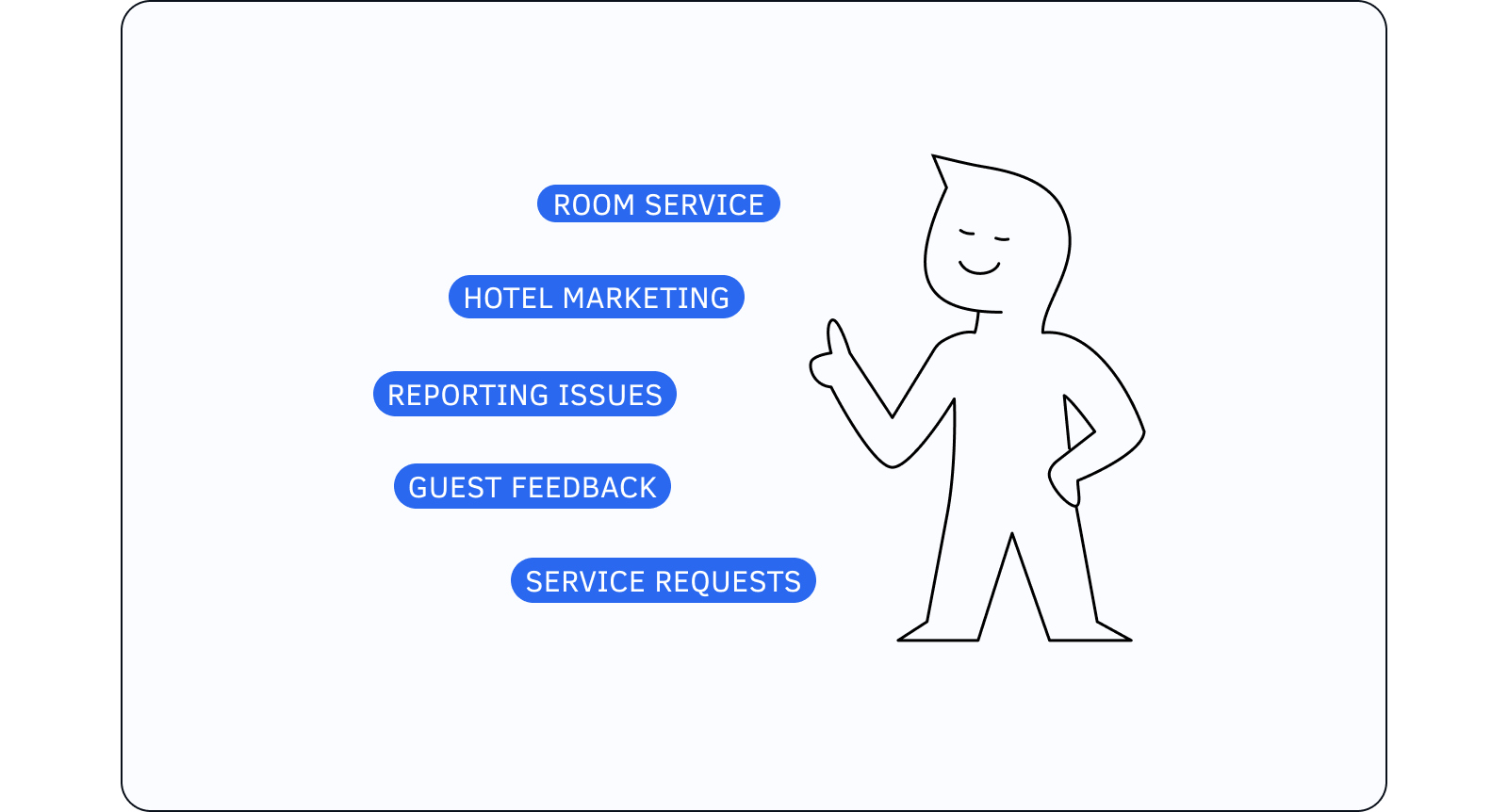 Benefits of using QR codes for guest experience
Benefits of using QR codes for guest experience
QR codes for hotels are increasingly used to streamline and enhance guest experiences. Their applications extend beyond simplifying check-in procedures and have expanded to various areas that cater to guests' needs.
- QR codes for check-in
Accelerating the check-in process is one of the areas where QR codes have made a significant impact. By scanning a QR code, guests can swiftly settle into their rooms without the hassle of lengthy paperwork. These QR codes can contain essential reservation details and payment links, or they can be integrated with access systems to provide secure entry to rooms, the gym, the pool, and other amenities. This seamless check-in experience sets the tone for a positive stay.
- QR codes for room service
QR codes have also become instrumental in facilitating room service orders. Guests can conveniently scan a QR code to access a digital menu, choose from a variety of options, and have their order delivered directly to their room. This streamlined approach ensures that guests can enjoy their desired food and drinks without any unnecessary delays or complications.
- QR codes for service requests
For additional services and requests during a guest's stay, QR codes prove to be invaluable. Whether guests require extra towels, toiletries, or laundry services, a simple scan of a QR code enables them to place their requests. High-end hotels take this a step further by providing concierge services, pillow menus and offering personalised services. All this information can be easily accessed by scanning the QR code, making it more convenient for guests to find what they need — and for hotels potentially to upsell additional services.
- QR codes for reporting an issue
Addressing guest issues promptly is vital for ensuring a satisfactory experience. By providing QR codes for guests to report any maintenance or technical issues, hotels can significantly reduce response times. Whether it's a malfunctioning air conditioner or a Wi-Fi connectivity problem, guests can quickly notify hotel staff through the QR code, enabling swift resolutions and maintaining guest satisfaction.
- QR codes for guest feedback
To capture valuable guest feedback, QR codes serve as an efficient feedback channel. This enables guests to provide their opinions, suggestions, and positive experiences effortlessly, allowing hotels to measure and improve guest satisfaction effectively.
- QR codes for hotel marketing
QR codes can be leveraged for marketing and promotional purposes. Hotels can include QR codes on promotional materials, such as brochures and flyers, encouraging guests to book directly through the hotel's website. This can increase direct bookings and reduce commission fees paid to third-party booking sites.
The typical process with QR codes involves guests scanning the code using their smartphone's camera, which then opens a corresponding web page. That means that each request type would require a separate QR code.
However, with the help of TagPoint, a powerful digital solution, hotels can unlock the full potential of QR codes for improving guest satisfaction and operational efficiency.
TagPoint is a comprehensive Computerised Maintenance Management System (CMMS), which can help hotels consolidate all types of requests into a single user-friendly app. Guests can effortlessly scan a single QR code with their smartphone and instantly access a full list of available hotel services.
With just a few clicks, guests can submit their requests and get real-time updates on service delivery timelines. The request is then automatically routed to a specific employee. This eliminates the unnecessary involvement of the front desk, ensures faster response times and eliminates the risk of lost or duplicated requests.
Read our success story of implementing TagPoint in a boutique hotel: How An Easy-to-Use App Helps Your Guests Fall in With Your Business
How QR codes are used to improve hotel team efficiency
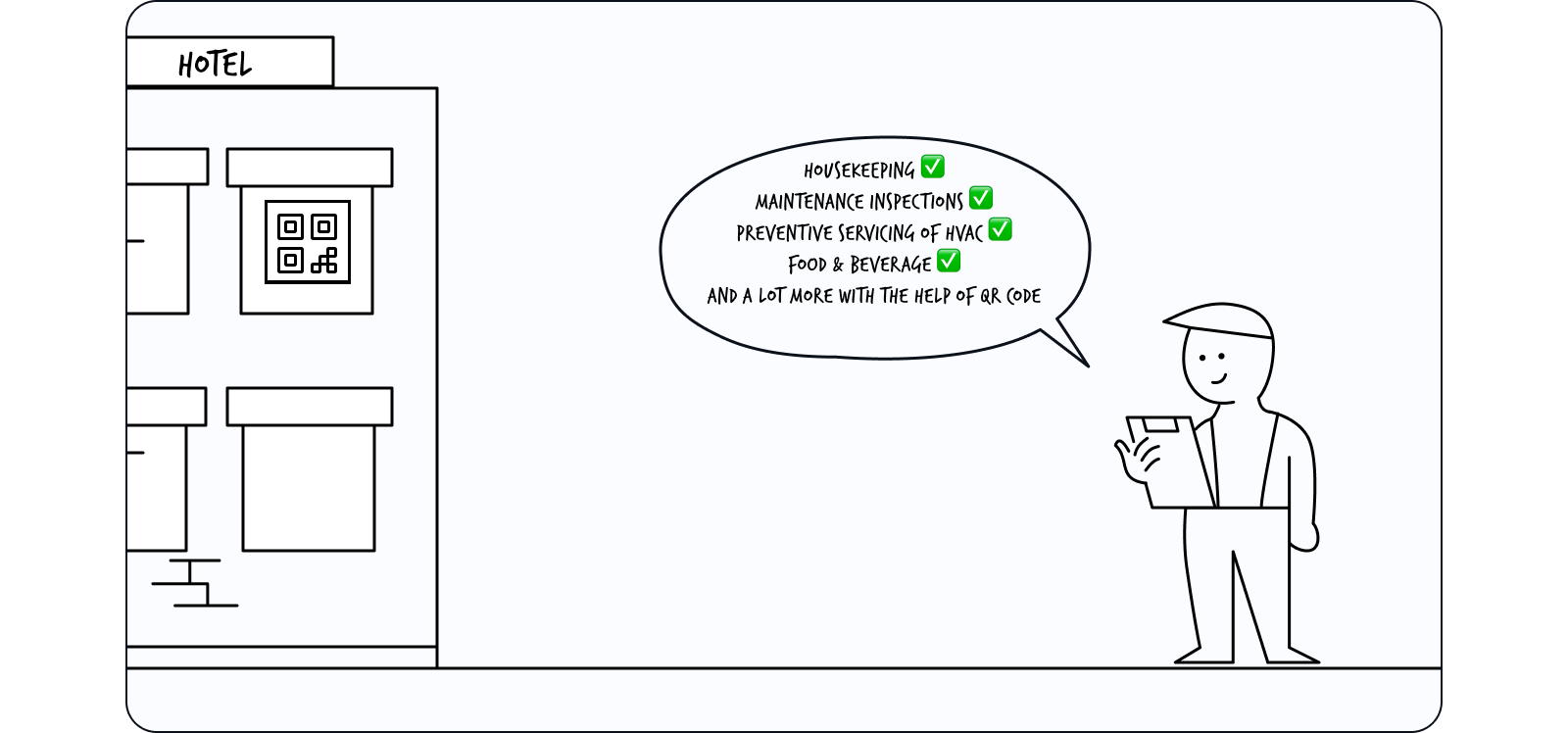 Benefits of using QR codes for team efficiency
Benefits of using QR codes for team efficiency
While QR codes have become increasingly prevalent in guest-facing services, their potential for improving internal operations is often overlooked. However, these versatile tools can greatly benefit hotel staff members, including housekeeping, maintenance, and other teams.
QR codes can be effectively employed by hotel staff and managers to streamline internal tasks and service requests. For instance, imagine a manager on duty noticing a faulty light bulb in a corridor. They can swiftly generate a service request by scanning a QR code, alerting the maintenance team to address the issue promptly.
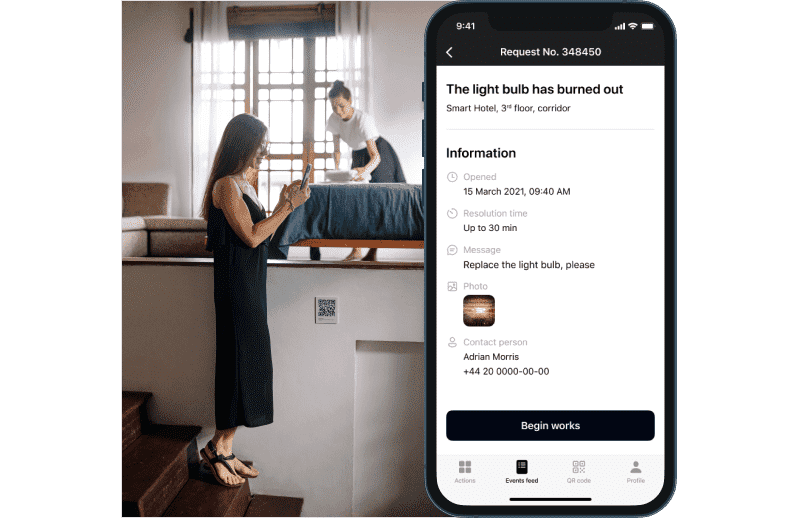 How QR codes help to streamline tasks and requests
How QR codes help to streamline tasks and requests
Furthermore, QR codes can facilitate regular maintenance inspections and housekeeping rounds, such as preventive servicing of HVAC, lighting, or fire protection systems. When an engineer scans a QR code, a maintenance checklist or information about previous inspections can be instantly accessed, ensuring thorough and efficient procedures.
With the assistance of TagPoint CMMS, hotels can expand the scope of QR code applications to support internal operations seamlessly. TagPoint enables coordination among front desk, housekeeping, maintenance, and food & beverage departments, all within a single app.
Easy-to-use app for facility managers
Future-ready way to digitalise your service requests, coordinate your teams and continuously improve.For instance, TagPoint provides pre-built checklists designed to inspect rooms, common areas, and equipment, streamlining the process for staff members. Additionally, the app sends timely reminders for recurring scheduled procedures, helping teams meet deadlines and comply with necessary standards.
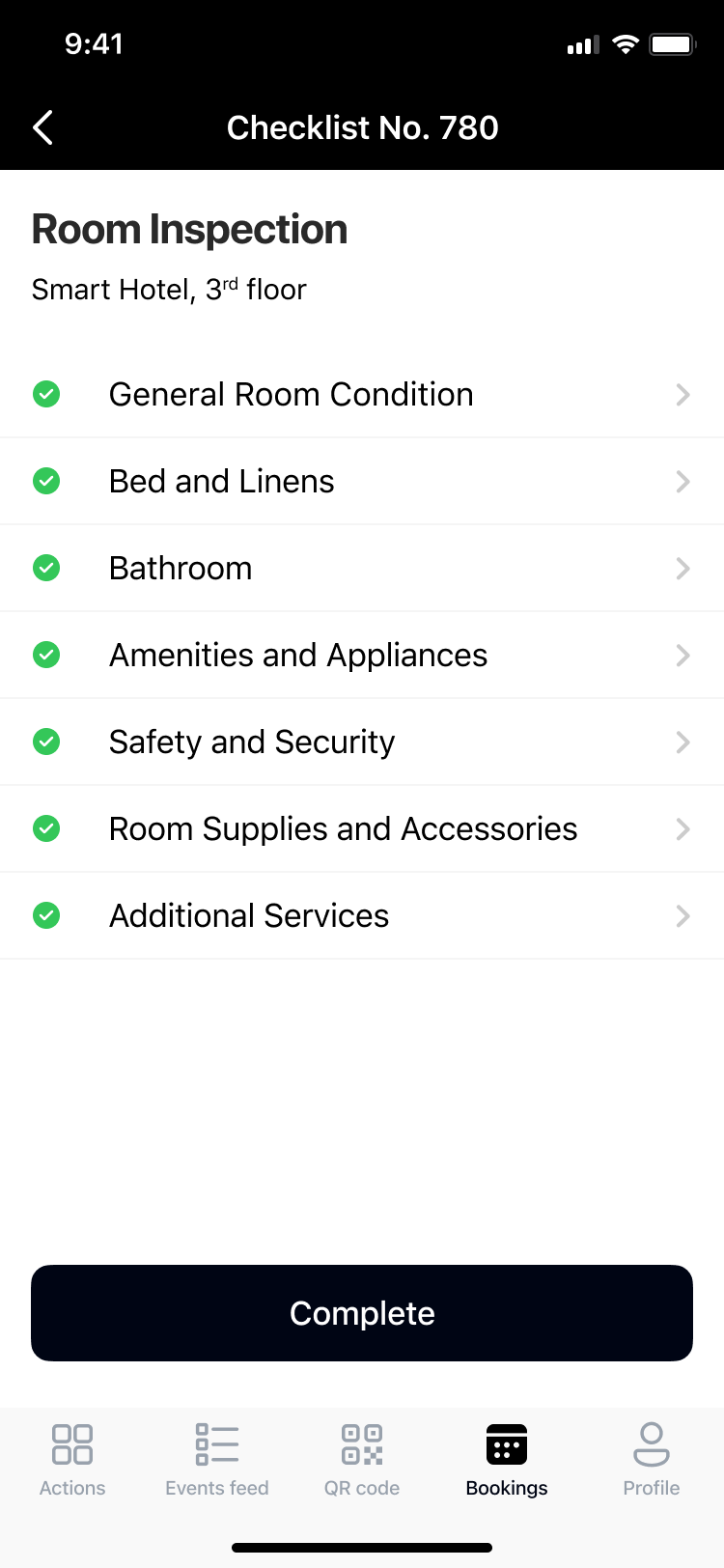
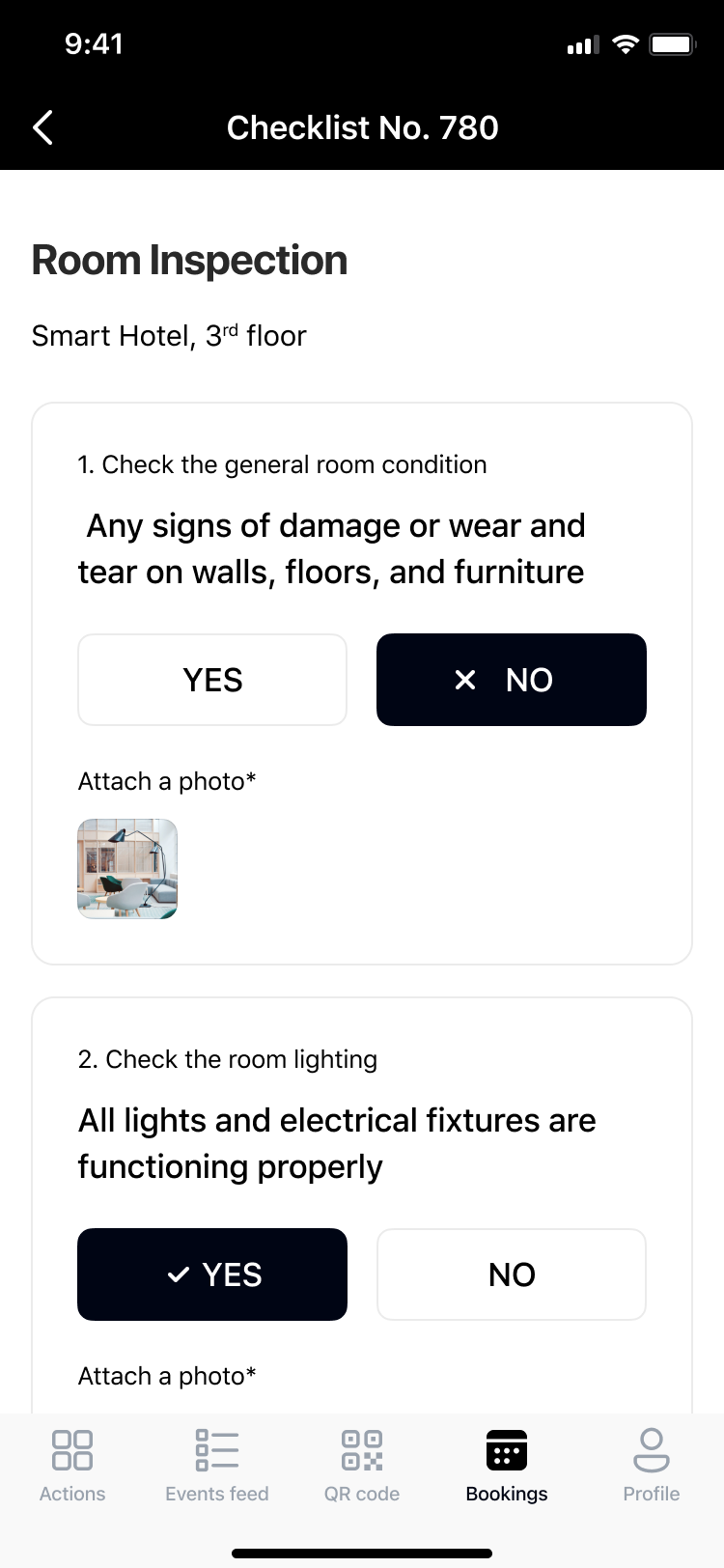
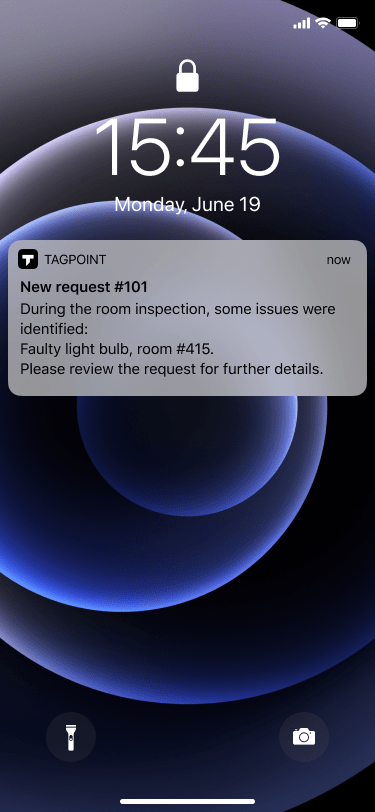
Why it is easy to use TagPoint for automating essential hotel business processes
Quick recap: What are the benefits of using QR codes in hotels
Before QR codes became common in the hospitality industry, these processes were largely manual and required personal interaction. Many hotels still manage the same old way. To request a service or report an issue, a guest has to call and physically walk to the front desk, which forwards the request to the appropriate departments.
In the era of digitalisation, hotel management can greatly benefit from QR codes. They provide an easy and efficient way to connect with guests and coordinate internal teams, taking guest experience to a whole new modern level. Let's outline the benefits of QR codes.
- Enhanced guest experience
QR codes provide easy access to relevant information, personalised services, and dining options, leading to more enjoyable experience, higher guest satisfaction and more positive reviews.
- Streamlined operations
QR codes simplify and expedite various guest-facing and internal housekeeping and maintenance processes, from check-ins and service requests to engineering inspections. This optimises task management and ensures a seamless workflow across various hotel departments.
- Contactless and modern experience
QR codes enable safe and contactless interaction, allowing guests to order services without physical contact. This aspect proved to be particularly important in the context of the COVID-19 pandemic.
- Efficient communication
QR codes facilitate accurate and prompt communication between guests and staff, reducing misunderstandings and language barriers for international travellers.
- Data collection and analytics
QR codes gather valuable guest data for analysis, enabling data-driven decisions, staff performance evaluations, and continuous improvement of the guest experience.
- Cost-effective solutions
Implementing QR codes reduces the need for printed materials, such as menus, brochures, informational leaflets, resulting in cost savings for hotels and promoting an eco-friendly approach.
- Sustainability initiatives
By utilising QR codes, hotels contribute to sustainability efforts by minimising paper waste and embracing digital solutions, aligning with guests' increasing environmental consciousness.
To summarise, QR codes have firmly established themselves as a valuable tool in the hospitality industry, providing a multitude of benefits that enhance guest experiences and optimise hotel operations. From contactless interactions with guests, to streamlined service and maintenance processes, QR codes have become a powerful tool for hotels to stay ahead in the digital era.
To explore the full potential of QR codes in your hotel, book a live demo of TagPoint CMMS.




